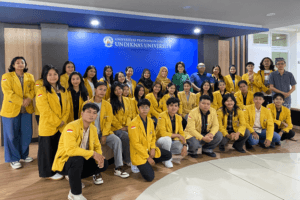
Building Awareness: Key to Success in Higher Education in 2024
Denpasar – Amid globalization and technological advancement, higher education faces increasingly complex challenges. To prepare students for the real world, educational institutions must not only impart academic knowledge but also build character and self-awareness. The inspirational story from the experiences of Dr. Drs. I Nyoman Subanda, M.Si, Universitas Pendidikan Nasional lecturer and social-political observer, shows that “building awareness” is an effective strategy in transforming education.
Students from difficult economic backgrounds often face additional challenges in achieving academic success. However, with an approach focused on building awareness, many of them can turn things around. By awakening an awareness of the importance of education, students begin to see learning as a way out of poverty and a means to achieve a brighter future. Dr. Subanda noted, “To get them to study, we need to awaken their awareness that through studying they will become smarter and with more intelligence they will have a better future.”
According to him, higher education should also focus on character development. Students need to be taught to value hard work and honesty. A real-life example is students who do not take more than their share of food, even without supervision. They realize that taking more than necessary would harm their peers. “They are awakened to the fact that if they take more, there are people who will not get their share,” Dr. Subanda explained.
In addition to personal ethics, awareness of social responsibility also needs to be instilled. Students need to understand that their actions affect others. For example, in discussion forums or lectures, they need to learn to listen attentively and not interrupt, as everyone deserves to be heard and respected. Dr. Subanda stated, “They are aware that if they speak up, there are others whose voices will not be heard.”
Higher education should also teach students to care for the environment. They should be encouraged to engage in activities that promote cleanliness and environmental preservation. Awareness that a green and clean environment is good for their health makes students more responsible towards their surroundings. “They are awakened to the fact that greening is good for health,” said Dr. Subanda.
From Dr. Subanda’s experiences, it can serve as a model for educational institutions to adopt an approach that emphasizes the development of awareness in all aspects of student life. Here are some steps that can be taken:
- Integration of Awareness Curriculum: Educational curricula should include teaching about the importance of self-awareness, ethics, and social responsibility from an early stage.
- Teacher Training: Teachers should be trained to become facilitators capable of awakening students’ awareness of the importance of learning, ethics, and social responsibility.
- Community Engagement: Universities should collaborate with local communities to provide students with direct experiences of the importance of environmental conservation and helping others.
- Evaluation and Recognition: Evaluation systems should not only be based on academic achievement but also on the development of students’ character and social awareness. Recognition should be given to students who show significant progress in these aspects.
Building awareness is key to creating a generation that is not only intelligent but also dignified and responsible. Dr. Subanda’s experiences show that with awareness, students from less privileged backgrounds can become accomplished individuals who contribute positively to society. Higher education in 2024 should draw inspiration from this model to address increasingly complex future challenges. Thus, we can hope for the formation of a better, fairer, and more prosperous society.



